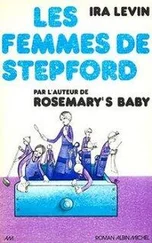“What does he teach, her professor—political science?”
“Biology.”
“Biology?”
“That’s right. I have to go out now, but we’ll be in all day tomorrow.”
“I’ll call. Thank you, Klaus. Good-by.”
He hung up.
So much for nice symmetry.
A professor of biology?
Seibert was relieved not to have had to be the one to break the news to Mengele, but he also felt he had got off the hook perhaps too easily; his long association with Mengele, and his admiration of his truly remarkable talent, suggested that he offer some sort of expression of commiseration and good cheer, and in fairness to himself he also wanted to present a fuller description than Ostreicher claimed to have given of the heated battle he had fought against Rudel, Schwartzkopf, et al. He tried to raise Mengele on the radio during the weekend, and unable to do so, flew out to the compound early Monday afternoon, taking his six-year-old grandson Ferdi along for the flight and bringing with him new recordings of Die Walküre and Götterdämmerung .
The landing strip was empty. Seibert doubted that Mengele had stayed on in Florianópolis, but it was possible that he was in Asunción or Curitiba for the day. Or he might only have sent his pilot into Asunción for supplies.
They walked along the pathway toward the house, Seibert and prancing Ferdi, with the co-pilot, who wanted to use the bathroom, walking behind them.
No one was about—no guards, no servants. The barracks, whose door the co-pilot tried, was locked, and the servants’ house was closed and shuttered. Seibert grew uneasy.
The main house’s back door was locked, and its front door too. Seibert pounded and waited. A small toy tank lay on the floorboards; Ferdi bent to it, but Seibert said sharply, “Don’t touch!”—as if infection might lurk.
The co-pilot kicked in one of the windows, elbowed away the remaining peaks of glass, and carefully put himself through. A moment later he unlocked and opened the door.
The house was deserted but in good order, with no signs of a hasty departure.
In the study, the glass-topped desk was as Seibert had seen it last, the painting things lined up on a towel at a corner. He turned to the chart.
It was raped with red. Slashes like blood tore down through the boxes in the third and second columns. The first column’s boxes held neat red checks halfway down, then larger and wilder checks, stabbing beyond the boxes.
Ferdi, looking worried, said, “He went outside the lines.”
Seibert gazed at the ravaged chart. “Yes,” he said. “Outside the lines. Yes.” He nodded.
“What is it?” Ferdi asked.
“A list of names.” Seibert turned and put the package of records on the desk. A bracelet of animal claws lay at its center. “Hecht!” he called; and louder, “ Hecht! ”
The co-pilot’s answering “sir?” came faintly.
“Finish what you’re doing and go back to the plane!” Seibert picked up the bracelet. “Bring me a can of gas!”
“Yes, sir!”
“Bring Schumann back with you!”
“Yes, sir!”
Seibert examined the bracelet and tossed it back onto the desk. He sighed.
“What are you going to do?” Ferdi asked him.
He nodded toward the chart. “Burn that.”
“Why?”
“So no one ever sees it.”
“Will the house catch on fire?”
“Yes, but the man who owns it isn’t coming back.”
“How do you know? He’ll be angry if he does.”
“Go play with that little toy outside.”
“I want to watch.”
“Do as I say!”
“Yes, sir.” Ferdi hurried from the room.
“Stay on the porch!” Seibert called after him.
He pushed the long table with its stacks of magazines close against the wall. Then he went to the file drawers under the laboratory window, crouched and opened one, and took out a thick handful of folders and another thick handful. He brought them to the table and fitted them between magazine stacks. He looked ruefully at the red-slashed chart, shook his head.
He brought several loads of folders to the table, and when there was room for no more, opened the remaining drawers. He unlocked and opened the windows behind the desk.
He stood looking at the Hitler memorabilia above the sofa, took three or four items from the wall, looked speculatively at the large central portrait.
The co-pilot came in with a red fuel can; the pilot stood in the doorway.
Seibert put the things he had taken on the package of records. “Take out the portrait,” he told the co-pilot. He sent the pilot off to make sure no one was in the house and to open all the windows.
“May I stand on the sofa?” the co-pilot asked.
Seibert said, “My God, why on earth not?”
He poured gasoline over the folders and magazines, standing well back, and tossed a few splashes up onto the chart itself. Names gleamed wetly: Hesketh, Eisenbud, Arlen, Looft .
The co-pilot carried the portrait out.
Seibert put the can outside the door and went to the open file drawers. He took from one a few sheets of paper and twisted them into a white branch as he moved to the desk. He picked up the lighter there, a cylindrical black one, and pressed flame from it a few times.
The pilot reported no one in the house and the windows open. Seibert had him take out the records and mementos and the fuel can. “Make sure my grandson’s there,” he told him.
He waited a moment, lighter in one hand, white paper branch in the other. “ Is he with you, Schumann? ” he called.
“Yes, sir!”
He lit the tip of the branch and put the lighter back behind him; dipped the branch to strengthen the flame, and stepping forward, threw it onto the flame-bursting folders and magazines. Flame sheared up the wall.
Seibert stepped back and watched the red-slashed center column of the chart blister and go brown. Names, dates, and lines, sheeted with flame, died away as blackness grew around them.
He hurried out.
Behind the house they stopped and watched awhile, well back from the wavering heat and the crackling: Seibert holding Ferdi’s hand, the co-pilot resting a forearm on the frame of Hitler’s portrait, the pilot with his arms full and the red can by his feet.
Esther had her hat and coat on and one foot out the door—literally—when the phone rang. This was not her day. Would she ever get home? Sighing, she drew the foot back, closed the door, and went and answered the ringing phone in the faint light from the doorpane.
An operator, with a call for Yakov from São Paulo; Esther told her Herr Liebermann was out of town. The caller, in good German, said he would speak to her . “Yes?” she said.
“My name is Kurt Koehler. My son Barry was—”
“Oh yes, I know , Herr Koehler! I’m Herr Liebermann’s secretary, Esther Zimmer. Is there any news?”
“Yes, there is, and it’s bad news. Barry’s body was found last week.”
Esther groaned.
“Well, we’ve been expecting it—no word in all this time. I’m starting home now. With…it.”
“Ei! I’m so sorry, Herr Koehler!”
“Thank you. He was stabbed, and then dumped in the jungle. From a plane, apparently.”
“Oh my God…”
“I thought Herr Liebermann would want to know—”
“Of course, of course! I’ll tell him.”
“—and I also have some information for him. They took Barry’s wallet and passport, of course—those filthy Nazi pigs—but there was a piece of paper in his jeans that they overlooked. It looks to me as if he wrote down some notes while he was listening to that tape recording, and there’s a great deal here that I’m sure Herr Liebermann can make use of. Could you tell me where I can get in touch with him?”
Читать дальше











